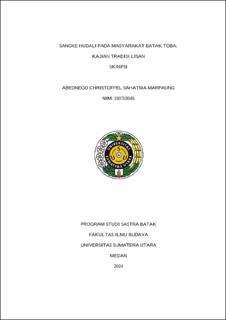Sangke Hudali pada Masyarakat Batak Toba: Kajian Tradisi Lisan
Sangke Hudali in The Toba Batak Community: A Study of Oral Traditions

Date
2024Author
Marpaung, Abednego Christoffel Sahatma
Advisor(s)
Sinaga, Warisman
Damanik, Ramlan
Metadata
Show full item recordAbstract
This thesis is entitled Sangke Hudali in the Toba Batak Community: a study of
Oral Traditions. This research aims to describe the stages of the Sangke Hudali
tradition in the Toba Batak community, describe the function of the Sangke
Hudali oral tradition in the Toba Batak community, describe the values of the
Sangke Hudali oral tradition in the Toba Batak community. This tradition is
defined as a traditional tradition which aims to express gratitude to God Almighty
and also to establish a sense of unity among the people of Pantis Village. The
theory used is the oral tradition theory put forward by Robert Sibarani. In this
thesis, descriptive methods are used. Oral traditions are traditional cultural
activities of a collection of communities that are passed down from generation to
generation through oral media from one individual to another from the
composition of verbal words and other non-oral traditions. The results obtained
in this thesis are six stages of the Sangke Hudali tradition, namely determining the
date, maneat horbo, mangalahat, eating together, martangiang tu nausea,
mandok hata sahuta, the function of the Sangke Hudali tradition, and the nine
values of the oral tradition in each stage of the Sangke tradition. Hudali is the
value of piety, the value of gratitude, the value of affection, the value of hope, the
value of sacrifice, the value of sincerity, the value of politeness, the value of
morals and the value of family.
Collections
- Undergraduate Theses [247]
